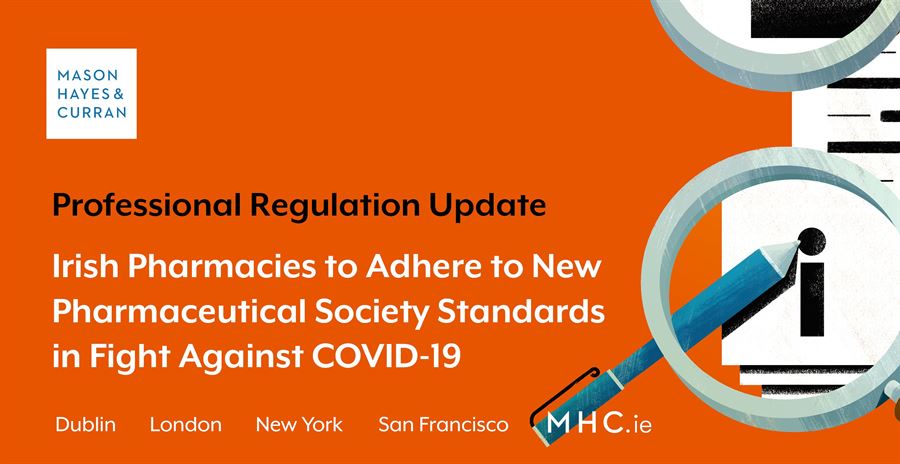Irish Pharmacies to Adhere to New Pharmaceutical Society Standards in Fight Against COVID-19

Since 2007 the pharmacy regulator, the Pharmaceutical Society of Ireland (“PSI”), has primarily used the legal provisions of the Pharmacy Act 2007 and the Regulation of Retail Pharmacy Businesses Regulations 2008 (as amended) as a means of regulating pharmacists and pharmacies. While these provisions continue to apply, the PSI has now helpfully supplemented these legislative requirements with outcome-based Standards which are intended to define what good performance looks like.
Scope of the new Standards
In response to the unprecedented public health emergency caused by COVID-19, the PSI, for the benefit of those it regulates and the public at large, has developed COVID-19 Operational Standards (“Standards”) which apply to all pharmacies.
The Standards, which can be accessed here, outline a specific code that the PSI expects pharmacies to follow in the context of COVID-19.
The PSI has produced these Standards in recognition that, as the pandemic continues, it is important to ensure that a consistent standard of safe and quality care is delivered to patients and the public across pharmacies. The Standards aim to provide concise, outcome-focused statements to guide those people involved in the governance and leadership of pharmacies.
Where the responsibility lies
Responsibility for meeting the Standards lies with those who have statutory governance responsibilities in accordance with the Pharmacy Act 2007 and associated relevant regulations. These include pharmacy owners, superintendent pharmacists and supervising pharmacists.
The Standards will help ensure pharmacies are consistent in their approaches and should be used to support a co-ordinated approach to dealing with any further changes and challenges which may arise during the course of the pandemic.
The Standards will also inform the public as to what they can expect from their pharmacies and provide continued assurance that pharmacies are a safe and supportive healthcare environment.
Four key areas
The Standards cover four domains, with Quality and Safety being the overarching principles. These domains are good governance, the pharmacy team, the pharmacy setting and the pharmacy services. They are not stand-alone standards, but mutually inform and cross-reference each other. Each standard is equally important and provides outcome-focused indicators against which a pharmacy owner, superintendent pharmacist and supervising pharmacist can assess compliance with the Standards. However, the indicators are indicative rather than prescriptive, and other indicators may be used to assess how a standard is met. The PSI has outlined that they welcome innovation as regards to how pharmacies meet the Standards and feedback is being sought.
The standards cover a range of areas including infection prevention and control, patient and staff safety, as well as continuity planning to ensure the ongoing provision of pharmacy and medicine services.
Conclusion
As the Standards are a further development in how the PSI regulates the pharmacy sector, a learning and engagement approach to implementation has been adopted through an initial ‘use and learn’ period. This flexible period will afford pharmacy owners, superintendent and supervising pharmacists time to reflect on their practice and adapt their operations as required. This period will also allow for feedback to be provided to the PSI on the use and relevance of the Standards before they are finalised.
While pharmacy owners, superintendent pharmacists and supervising pharmacists have overall responsibility for ensuring the Standards are in place, all registered pharmacists, including locum pharmacists, pharmaceutical assistants and other pharmacy staff should be familiar with the Standards.
For more information, please contact a member of our Public, Regulatory & Investigations team.
The content of this article is provided for information purposes only and does not constitute legal or other advice.
Share this:



